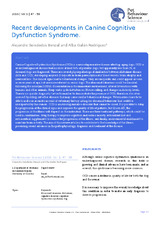Mostrar el registro sencillo del ítem
Recent developments in Canine Cognitive Dysfunction Syndrome
| dc.contributor.author | Seisdedos Benzal, Alejandro | |
| dc.contributor.author | Galán Rodríguez, Alba | |
| dc.date.accessioned | 2016-04-15T09:46:29Z | |
| dc.date.available | 2016-04-15T09:46:29Z | |
| dc.date.issued | 2016 | |
| dc.identifier.issn | 2445-2874 | |
| dc.identifier.uri | http://hdl.handle.net/10396/13423 | |
| dc.description.abstract | Canine Cognitive Dysfunction Syndrome (CCD) is a neurodegenerative disease affecting aging dogs. CCD is an underdiagnosed disease that involves at least 14% of geriatric dogs, but apparently less than 2% of diseased dogs are diagnosed. There are several physiopathological similarities between Alzheimer disease (AD) and CCD, developing amyloid-β deposits in brain parenchyma and blood vessels, brain atrophy and neuronal loss. The clinical signs lead to behavioural changes. They are unspecific and could appear as soon as seven years of age, but are more relevant in senior dogs. The abnormal behaviour could be classified following the acronym DISHA: Disorientation in the immediate environment; altered Interactions with humans and other animals; Sleep-wake cycle disturbances; House-soiling; and changes in Activity levels. There is no specific diagnostic test or biomarker to demonstrate the presence of CCD; therefore, it is often assessed by ruling out other diseases that may cause similar behavioural changes. Veterinarians have to be able to make an accurate account of veterinary history asking for abnormal behaviour that could be misreported by the owners. CCD is a neurodegenerative disorder that cannot be cured. It is possible to delay the progression of the clinical signs and improve the quality of life of patients, but like in AD, the progression of the illness will depend on the individual. There are three treatment pathways, which could be used in combination: drug therapy to improve cognition and reduce anxiety, antioxidant diet and nutraceutical supplements to reduce the progression of the illness, and finally, environmental enrichment to maintain brain activity. The aim of this review article is to contribute to the knowledge of the illness, presenting recent advances in the pathophysiology, diagnosis and treatment of the disease. | es_ES |
| dc.format.mimetype | application/pdf | es_ES |
| dc.language.iso | eng | es_ES |
| dc.publisher | Universidad de Córdoba, Departamento de Medicina y Cirugía Animal | es_ES |
| dc.rights | https://creativecommons.org/licenses/by-nc-sa/4.0/ | es_ES |
| dc.source | Pet Behaviour Science 1, 47-59 (2016) | es_ES |
| dc.subject | Abnormal behaviour | es_ES |
| dc.subject | Alzheimer | es_ES |
| dc.subject | Cognitive disorder | es_ES |
| dc.subject | Cognitive dysfunction syndrome | es_ES |
| dc.subject | Dogs | es_ES |
| dc.title | Recent developments in Canine Cognitive Dysfunction Syndrome | es_ES |
| dc.type | info:eu-repo/semantics/article | es_ES |
| dc.relation.publisherversion | http://www.uco.es/ucopress/ojs/index.php/pet/index | es_ES |
| dc.rights.accessRights | info:eu-repo/semantics/openAccess | es_ES |

